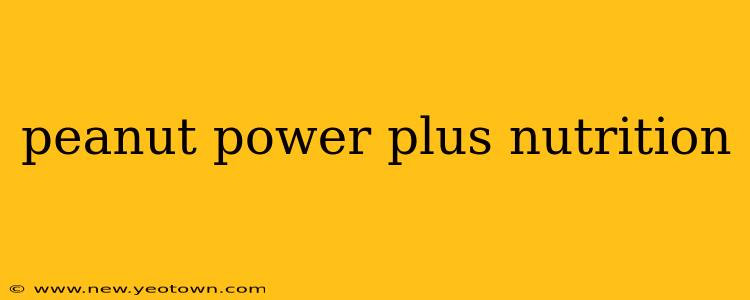Peanuts. Those humble, earthy legumes hold a surprising punch of nutrition, far exceeding their seemingly simple appearance. From boosting your energy to supporting heart health, peanuts offer a powerhouse of benefits. But what exactly makes them so special, and how can you best incorporate this "peanut power plus" into your diet? Let's dive into the delicious details.
What are the nutritional benefits of peanuts?
Peanuts are nutritional dynamos, packed with essential nutrients that contribute to overall well-being. They're a fantastic source of protein, providing the building blocks for muscle repair and growth. Beyond protein, they're rich in healthy fats, primarily monounsaturated and polyunsaturated fats, which are beneficial for heart health. These fats help lower LDL ("bad") cholesterol levels and raise HDL ("good") cholesterol, contributing to a healthier cardiovascular system.
Furthermore, peanuts are a good source of fiber, aiding in digestion and promoting gut health. They also contain various vitamins and minerals, including vitamin E (a powerful antioxidant), magnesium (essential for muscle and nerve function), and potassium (important for maintaining healthy blood pressure). This diverse nutrient profile makes peanuts a valuable addition to a balanced diet.
Are peanuts good for weight loss?
This is a question that often sparks debate. While peanuts are calorie-dense, their high protein and fiber content contribute to satiety, meaning they can help you feel fuller for longer. This can indirectly aid in weight management by reducing overall calorie intake. However, moderation is key. A handful of peanuts as a snack can be beneficial, but overindulging can lead to weight gain. The key is mindful consumption as part of a balanced, calorie-controlled diet.
What are the health risks associated with eating peanuts?
While generally safe and beneficial, peanuts do carry some potential risks. A significant concern is the possibility of allergic reactions. Peanut allergies are quite common and can range from mild to severe, even life-threatening. Individuals with known peanut allergies must strictly avoid all peanut products.
Another potential concern is aflatoxins, a type of mold that can grow on peanuts. These toxins can be harmful if consumed in large quantities. However, strict regulations and quality control measures in the food industry minimize the risk of aflatoxin contamination in commercially available peanuts.
Finally, consuming excessive amounts of peanuts can lead to weight gain due to their calorie density. As with any food, moderation is crucial to reaping the benefits without the drawbacks.
Are peanuts a good source of protein?
Absolutely! Peanuts are an excellent plant-based source of protein. A single serving (about one ounce, or approximately 28 grams) provides around 7 grams of protein. This makes them a valuable addition to vegetarian or vegan diets, contributing significantly to their daily protein intake. The protein in peanuts contains all nine essential amino acids, making it a complete protein source, although not as complete as some animal proteins.
How many peanuts should I eat per day?
There's no single "magic number" for daily peanut consumption. A reasonable serving size is generally considered to be about one ounce (approximately 28 grams), or around 15-20 peanuts, depending on their size. However, individual needs and dietary requirements vary, so it's always a good idea to consult with a nutritionist or healthcare professional to determine a suitable amount for your specific circumstances.
What are some creative ways to incorporate peanuts into my diet?
The beauty of peanuts lies in their versatility. They can be enjoyed in numerous ways:
- As a snack: A handful of roasted peanuts is a satisfying and nutritious snack.
- In cooking: Peanut butter is a staple in many cuisines, used in sauces, sandwiches, and desserts.
- In baking: Peanuts add a delicious crunch and nutty flavor to cookies, cakes, and other baked goods.
- As a spread: Peanut butter is a versatile spread for bread, crackers, and even apples.
- In smoothies: Adding peanut butter to smoothies adds creaminess and protein.
By understanding the nutritional benefits and potential risks, and incorporating peanuts mindfully into your diet, you can harness the “peanut power plus” for a healthier and more enjoyable lifestyle. Remember, moderation and awareness are key to reaping the full benefits of this versatile and nutritious legume.

